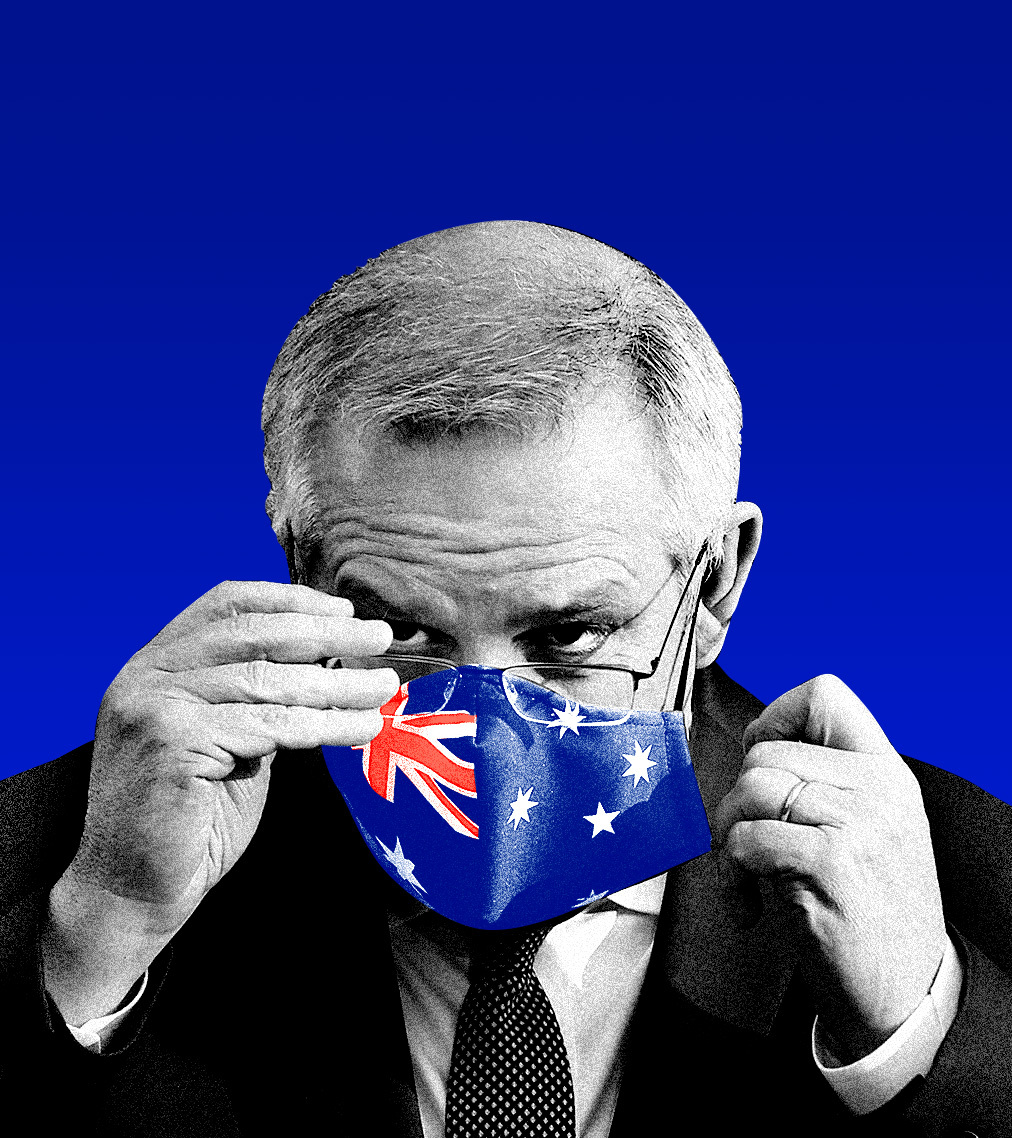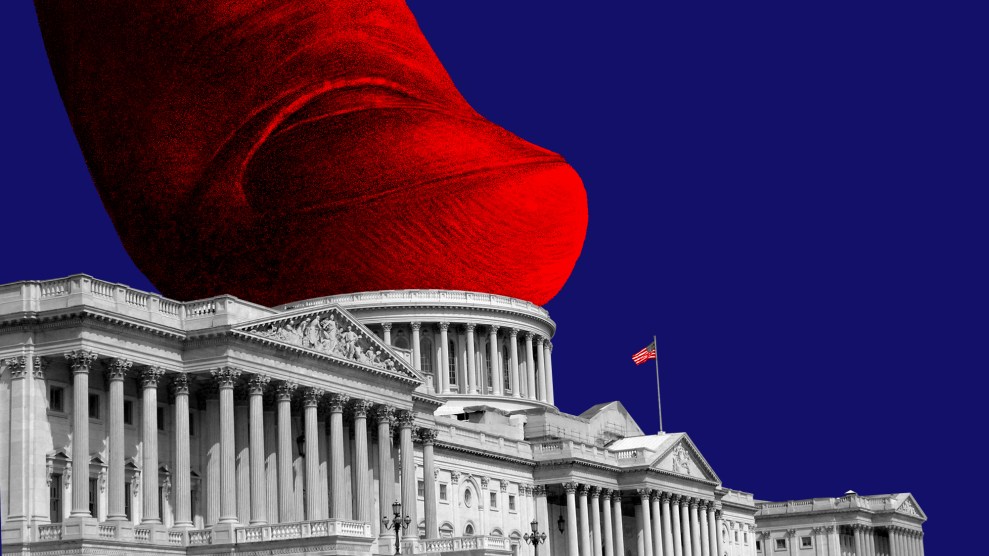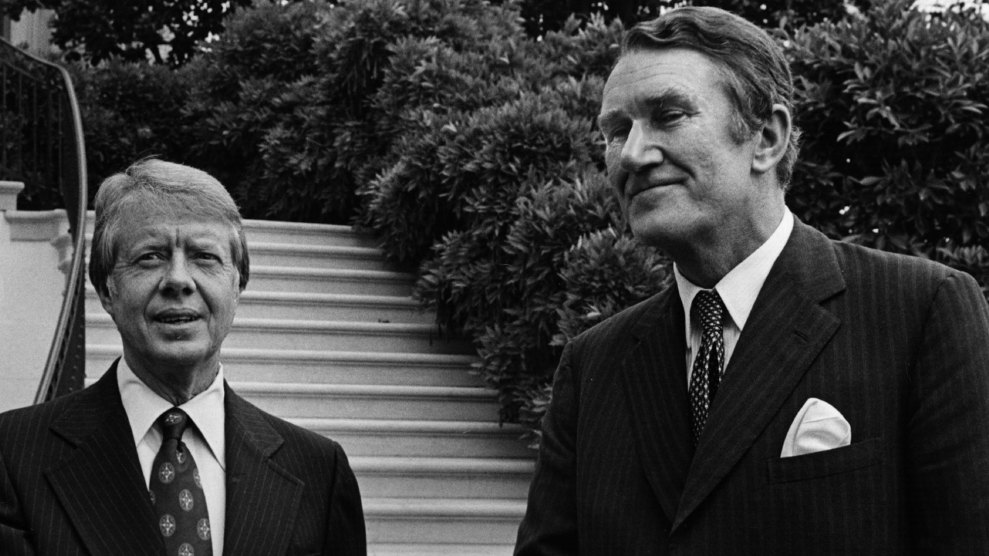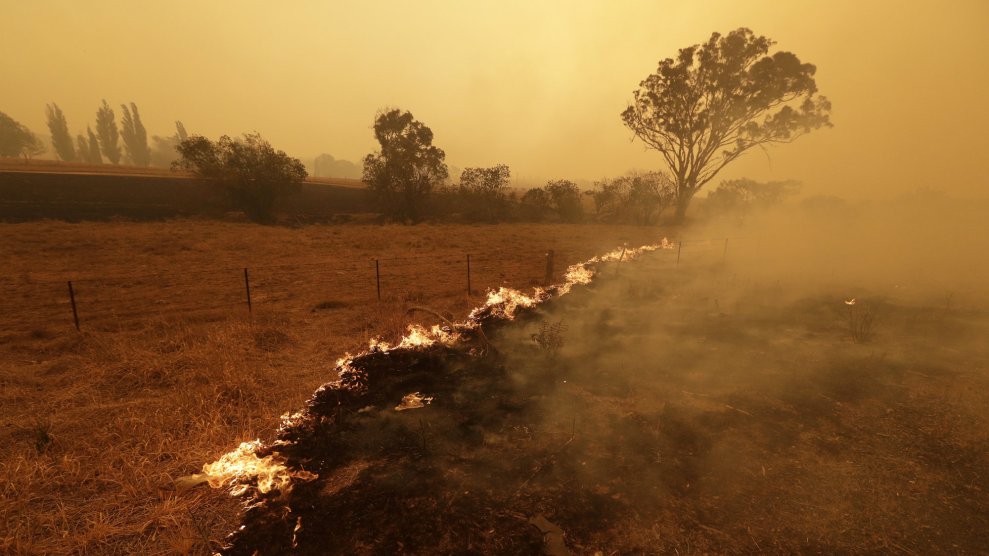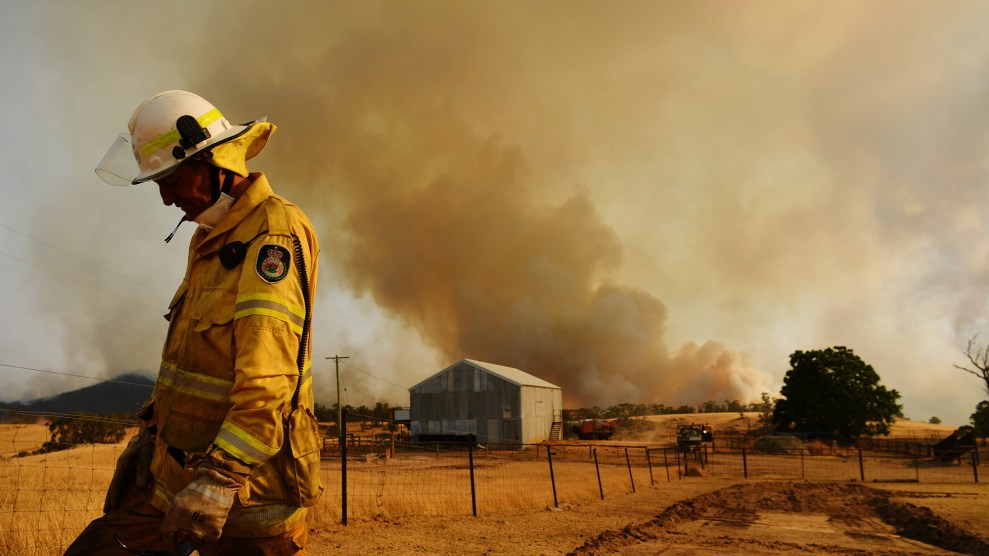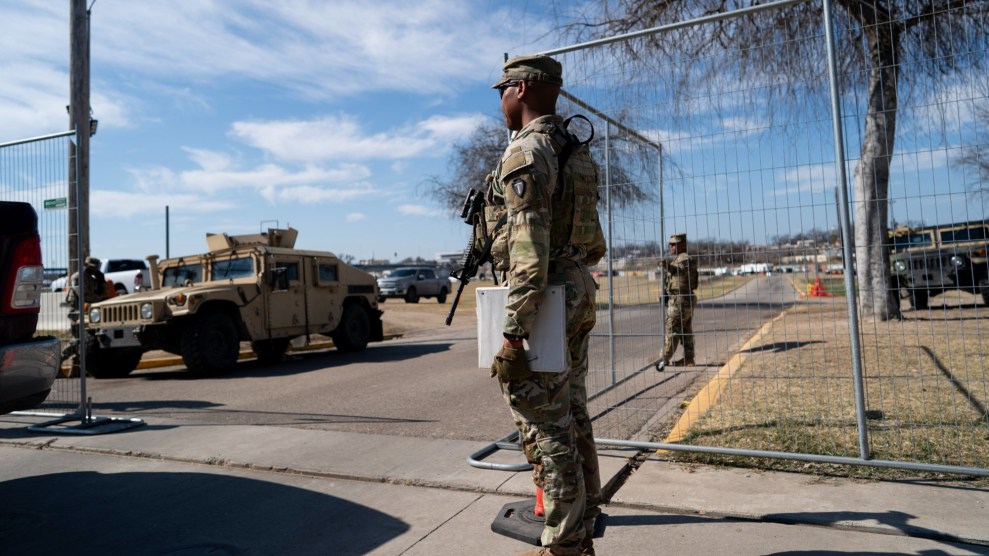Editor’s note: This article first appeared as a guest column in David Corn’s newsletter, Our Land, a twice-weekly dispatch about politics and media. Subscribing costs just $5 a month—but you can sign up for a free 30-day trial of Our Land here. Please check it out.
As an Australian living in the US, I’ve realized that nothing makes me pine for home more than our relatively snoozy elections. Seriously.
The comparisons are stark: While American elections never end, Australia preserves the fantasy that a “campaign,” including the one happening right now, comprises a few weeks of awkward photo-ops, flagrant pork-barreling, and media hyperventilation over minor gaffes. So far, so comforting.
America’s democratic system, attacked on every level from within, is backsliding. Federal elections are enacted through a vulnerable patchwork of state laws; the way things have been going, a willing coup participant could be sitting on your election board. By contrast, behold the Australian Electoral Commission, a trusted, nonpartisan body that quietly administers every election to exacting standards. American elections hinge on turnout, sometimes down to the street level, amid relatively poor national engagement. Australian elections enjoy vast participation, among the highest in the world. The AEC recently announced record enrollment—hailed by its boss as nothing short of a “democratic miracle.” But it is compulsory to vote in Australia, enforceable by fines, so that’s not much of a surprise, and anyway, is a miracle really a miracle if it barely makes the news? Insert shruggy emoji: It all just works.
In Australia, voting is a national celebration. On a Saturday. An entire country throws a “democracy sausage” cookout.
And then there are the candidates. The current prime minister, Scott Morrison, is battling to hold on to a one-seat majority and therefore his job. “ScoMo,” as he is known without much affection, leads the governing conservative coalition. Because this is Australia, ScoMo is up against a guy whose nickname also ends in “o”—a bit of humanizing marketing that Aussie politicians enjoy as the equivalent of eating a corndog at the Iowa State Fair. Anthony “Albo” Albanese is the opposition leader and head of the center-left Labor party. Despite being a fixture of Australian politics for decades as a footy-loving bloke, he is mainly drawing attention for his recent “glow-up” weight loss and new suits.
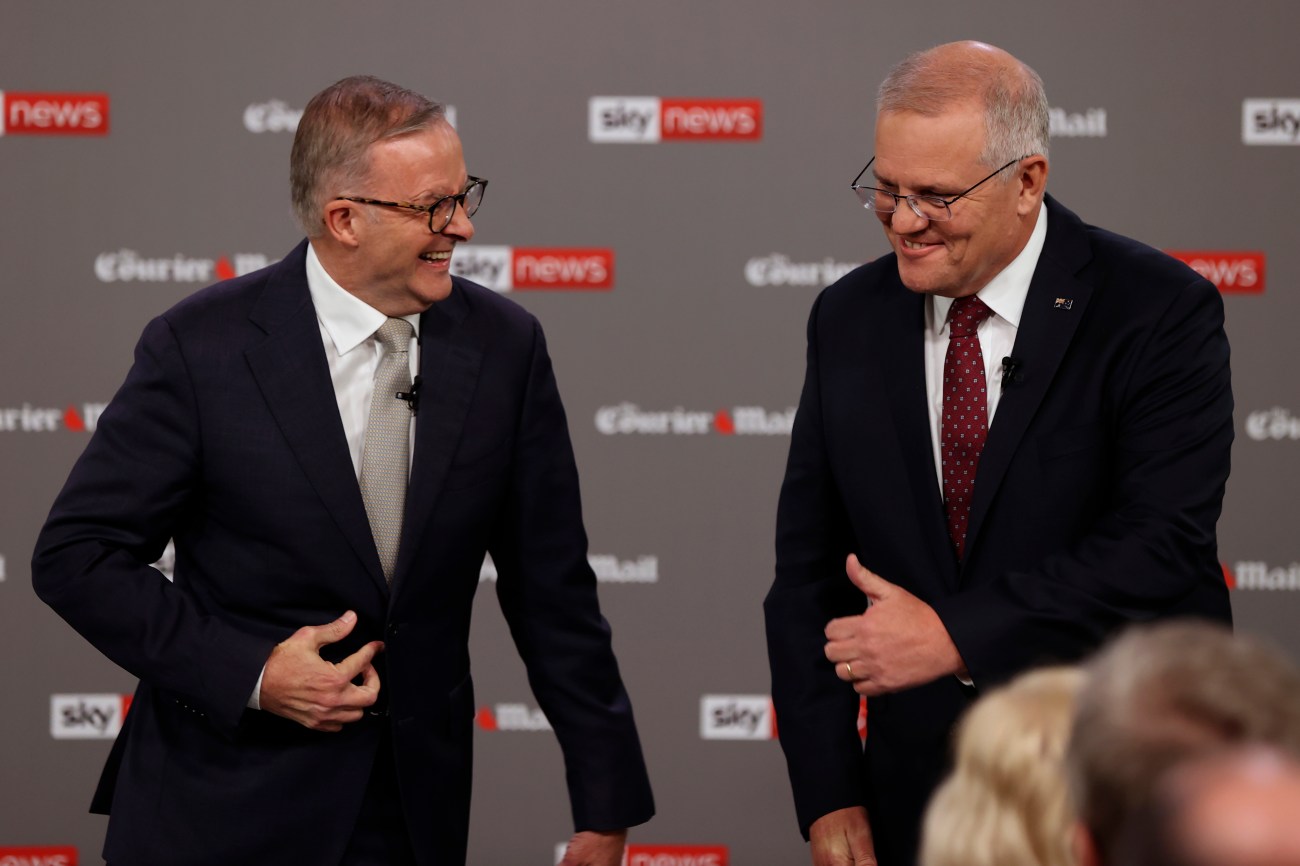
ScoMo, right, and Albo meet for a televised prime-ministerial debate on Murdoch’s Sky News in April.
Jason Edwards / AP
Of course, the leaders have significant policy differences and backgrounds. ScoMo is a pious evangelical who once, as the nation’s treasurer, extolled the virtues of coal by clowning around with a lump of it on the floor of parliament. “Don’t be afraid. Don’t be scared. It won’t hurt you,” he said. “It’s coal!” He rose to the prime ministership not through an election, but as an internal candidate of last resort after his bitterly divided party, while in power, threw out its leader amid a factional dispute.
Albo, on the other hand, is a backroom powerbroker and member of the party’s progressive wing, perhaps even a shade more Bernie than Biden. “I like fighting Tories,” he once said. “That’s what I do.” After a humiliating defeat for his predecessor three years ago, the uninspiring rationale for Albo, at least to casual observers like me, appeared to be “It’s his turn.”
The campaign has flattened these characters, extruding them of color and history: ScoMo vs. Albo, two familiar white men in their 50s, veteran politicians, performing the norms and rituals of campaigning with the flair of community theater. Just how we like it.
There is one important similarity between our democracies that American readers will immediately recognize: the powerful media influence of Rupert Murdoch. It’s true there is no TV equivalent to Tucker Carlson in Australia. Murdoch’s Sky News remains boutique in comparison to Fox News. Sky’s lineup is a life raft for washed-up culture warriors and other News Corp hardliners who eye America’s divisions with envy. However, Murdoch’s formidable press outfit is far more dominant per square inch of newsprint in Australia and is currently amplifying attacks on Albo as a boring inner-city big spender who is dangerously soft on China. Sound familiar? Murdoch is, after all, Australian, and perfected this sort of mendacious attack long ago, back home. The virus that is Murdoch’s News Corp was lab-leaked from an Adelaide tabloid in the ’50s.
“I’ve never met Rupert Murdoch in my life,” Albo insisted in an extensive February profile in The Monthly, the Australian political magazine. But he can’t avoid pandering to the mogul’s dailies. He recently sat for an interview with Sydney’s The Daily Telegraph to position himself as a “friend to business and aspirational Australians,” squarely in the mainstream. “Albo vows to swerve away from the left,” the front page blared. Then, in case we missed the point, in all-caps: “I AM NOT WOKE.”
this election is going to be very silly pic.twitter.com/17i8odmEKP
— Josh Butler (@JoshButler) March 22, 2022
Amid all this predictability, here’s the disturbing part. The “campaign”—the breathless horse-race coverage, the basic block-and-tackle of it all—is obscuring what could be a pivotal moment for the future of the nation, and in some respects, for the world.
I’ve written before of climate change as the killing fields of Australian politics, to borrow a phrase from Guardian Australia‘s Lenore Taylor. Dubbed the “climate wars,” disagreements, in part over climate policy, have killed off four sitting prime ministers and contributed to an extraordinary run of leadership chaos over the past decade. The most extreme effects of global warming are already happening in Australia. Dorothea Mackellar’s famous poem “My Country,” first published in the early 1900s and taught to Australian children everywhere, romanticizes the “sunburned country…Of drought and flooding rains.” Her quaint vision of a nation held together against the elements has morphed into a biblical horror cycle of extreme fires, record-setting floods, and actual plagues. As long-term costs to Australia’s roads and infrastructure become fixtures of national budgets, the conservatives in power are still low-balling climate commitments while winking at the far-right flank: It’s not really that bad.
“The generations of Australians that went before us, including our First Australians, also faced natural disasters, floods, fires, global conflicts, disease and drought,” the PM said during Australia’s 2019–2020 bushfire season, the worst on record. “We have faced these disasters before and we have prevailed, we have overcome.”
Don’t mind the flaming koalas.
Australians know what it’s like to live on these frontiers, and that’s reflected in national sentiment. A growing majority of Australians say climate change is a pressing concern, according to a 2021 poll. In an eight-point jump since 2019, the same survey reported that 55 percent of Australians now say the government’s top priority for energy policy should be “reducing carbon emissions.” Six out of 10 eligible voters think ScoMo’s commitment to net-zero carbon emissions by 2050 won’t be enough, according to a recent YouGov poll. So, one theory goes, there must be conservative voters who are on the hunt for alternatives to the climate hardliners. Can they be picked off?
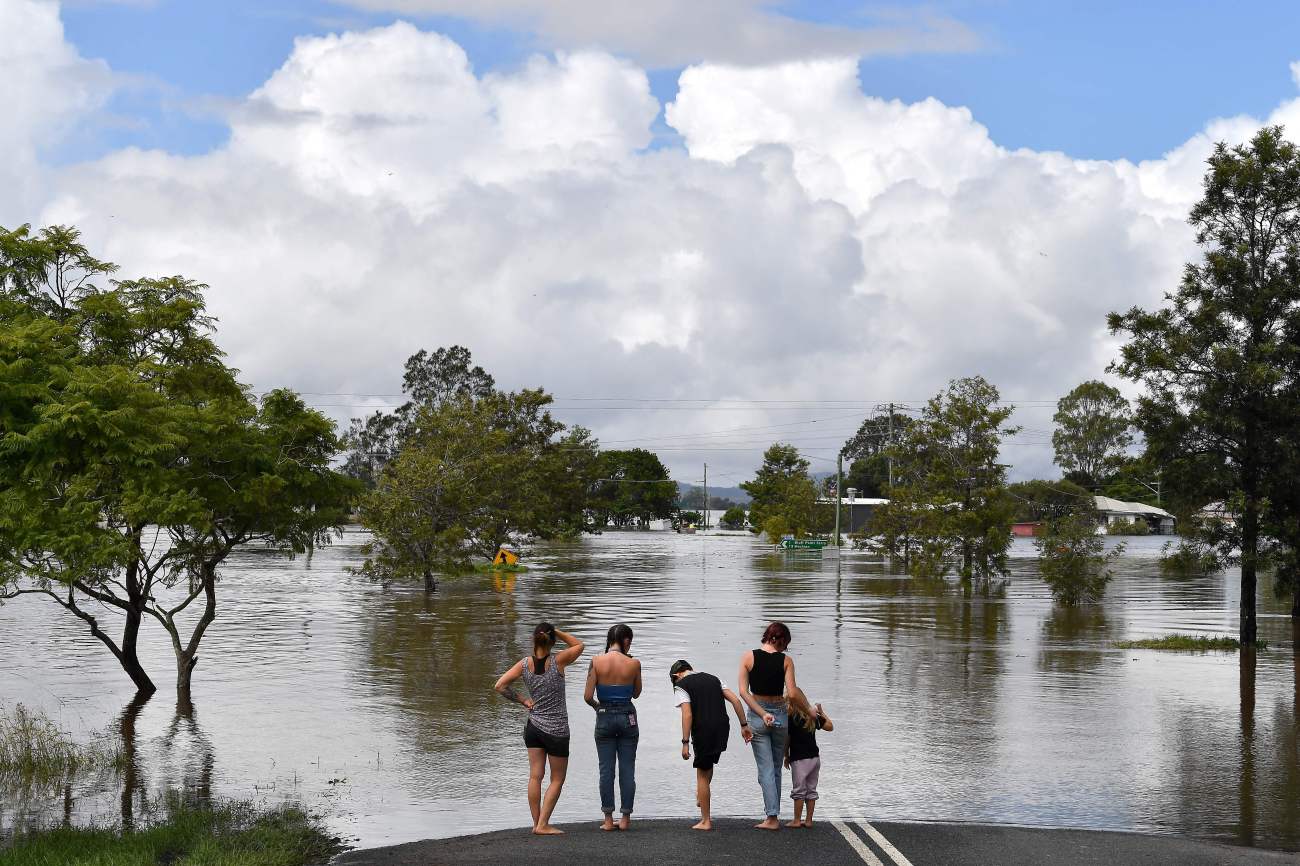
Deadly, record-setting floods hit Australia’s east in February and March, devastating towns like Lawrence, in rural New South Wales.
A massive injection of cash (by Australian standards) from the group Climate 200, reportedly around $10 million, is helping to test that theory, backing a slate of so-called “teal independents” contesting wealthy blue-ribbon seats. The idea is to direct voters to business-minded, climate-friendly candidates with the goal of putting whomever ends up running parliament on notice. This could fracture the conservative vote—an “existential threat,” warned one freaked-out Murdoch columnist last week. (A Climate 200–backed Melbourne independent, Zoe Daniel, has opened up a whopping 24-point lead over a conservative incumbent, according to one poll.) The Labor party may possess more aggressive climate pledges, but Albo, cautious of alienating anyone, is wary of making climate the centerpiece campaign issue. If his party doesn’t win a majority, it too will be beholden to these independents.
Meanwhile, the smaller, climate-first Greens party is enjoying a recent bump in popularity, which, given Australia’s ranked-choice voting system, could make the final picture even more complex.
The election is two weeks away. Unlike in America, there are no fancy FiveThirtyEight-style modelers tinkering with projections and fueling Election Day nightmares. The most prominent weekly poll has remained pretty consistent, showing Albo’s Labor poised to win. (Other polls show the same.) Of course, the last election also predicted a Labor win, and ScoMo, the conservative, eked out a victory. But his lackluster response to Australia’s drumbeat of apocalypse appears to have had a lasting impact, and, like Ted “Cancun” Cruz, he’ll be remembered for skipping town for Hawaii during the country’s worst bushfire crisis. He was lucky that the state governments controlled the basic mechanics of the coronavirus pandemic, sparing Australians the worst outcomes—but voters remember ScoMo’s bumbling excuses for what he could control, the country’s painfully slow vaccine rollout. His reaction to the pandemic can be seen as a scaled study of his government’s response to the bigger and more relentless assault of climate change across the continent.
If nothing else, Australians love to turf out a mob that has overstayed its welcome.
Right now, everything may seem typical, boring almost, but there are fractures in what former conservative PM John Howard once described as his ideal citizenry: a “relaxed and comfortable” electorate. Zoom out from the campaign, and Australia is a nation facing a signal moment. Will its people vote against the rising waters and the darkening skies? As Australians feast on their democracy sausages, will indelible memories of barbecued koalas be enough?
